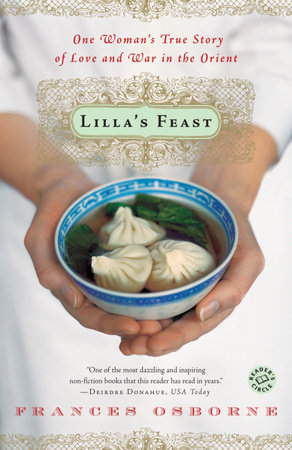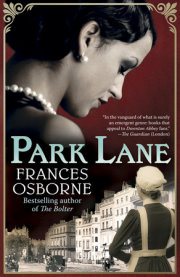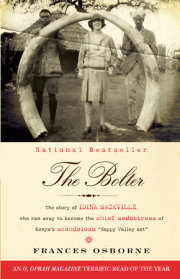Chapter 1
THE SWEET SMELL OF SPICE
CHEFOO, NORTH CHINA, THE SECOND-TO-LAST DAY OF MARCH 1882
Ada was born first, taking Lilla’s share of good luck with her. Or so everyone said. I’m not sure whether this was a Chinese myth to do with twins or just some family comparison of their two lives—for who can resist comparing the lives of twins? But when Lilla struggled into the world thirty minutes after her sister, she wailed, fists clenched, as if she already knew that she was going to have to fight to make up for being born without her fair share of fortune.
As far as the amah who looked after the two of them was concerned, Ada was Number One Daughter and Lilla, Number Two. When the amah picked up Ada to be fed first, Lilla learned to scream so that she was not forgotten. On the cold, dark mornings of those freezing north China winters that numbed the babies’ fingers and noses, Ada was the first to be swaddled in layers of warm clothes and Lilla had to shout to show that she was cold, too. The moment that a thick, slippery, silk ribbon was carefully woven into Ada’s plaits, Lilla pushed through her stutter to demand one for herself. And if Ada’s ribbon was pink, Lilla made sure that she had a pink one as well. “Right from the start,” I was told, “they had the most terrible fights—their shoes had to be put on each foot at the same time.”
To look at, Lilla and Ada were identical. Rummaging through the archives of the School of Oriental and African Studies at London University, I found a photograph of the pair of them, taken by a visitor to Chefoo when they were about eight years old. In it, they both have exactly the same pale, heart-shaped faces with high cheekbones and delicately pointed chins and noses. And the same long, dark brown—almost black—hair and bright blue eyes.
But only one of them is smiling. And I cannot tell which.
It was when the twins began to move around and talk—developing a twinly private language almost as soon as they did—that a difference emerged between them. The moment Lilla opened her mouth, her stutter betrayed her, while Ada spoke in smooth, clear tones. And when the pair of them started to totter around their redbrick, two-story, end-of-terrace home in the Chinese port of Chefoo (correctly pronounced “shee-fu” but anglicized to “chee-foo”)—a house designed to give its inhabitants the illusion of living in a safe British town—it was always Ada who went first. Lilla, a few paces behind, struggled to catch up with her elder sister as, black-booted and white-frilled, they clattered down the steep stone steps that led from the grand European villas and mock castles on Chefoo’s Consulate Hill to its port. There, they peered out over a harbor full of junks and, beyond them, to a volcanic reef of green pointed islands, like the spines on the back of a storybook dragon sitting down in the water. They watched as a coastal steamer from Shanghai slid through the water and a regatta of tall, swaying sailing ships and puffing, coal-driven barges from India, from Russia, from Japan, some even straight across the Pacific from San Francisco, nudged their way into moorings. They saw hundreds of barefooted coolies staggering up and down gangplanks—loading silks and peanuts to go to every corner of the world and unloading packages of narcotic brown powder from the hills of India—their conical straw hats shielding their dark-ringed eyes from the sun and hiding their sidelong glances in the direction of the sweet-smelling smoke seeping out from the doors of the opium dens.
And when Lilla and Ada played at being grown up, they strolled down the gentle slope on the far side of Consulate Hill that slid into the higgledy-piggledy beachfront. They promenaded, tiny parasols in hand, alongside the rattle of rickshaws and the pong of mule carts that wafted into the sea air. They wandered past the whitewashed Western holiday hotels, past the clink of glasses on the suburban-style Chefoo Club terrace, and past the square, squat tower of the austere St. Andrew’s Church with its triangular hat of a spire.
Wherever they were, Lilla was always abreast of Ada, as if she needed to make sure that she was never left behind again.
. . .
Lilla’s parents had ended up in China by chance. They met aboard a salty steamer puffing the long haul from London to Australia in early 1876. The ship was bulging with excited families on their way to start a new life, eager young men hoping to strike gold and make their fortunes, and Lilla’s mother, Alice Simons, who didn’t want to be there at all. Alice, who dreamed of being an opera singer, “was a bit of a handful,” writes one of her granddaughters, and had been caught as “she appeared to be about to elope with her music master.” Her family therefore “packed her off to Australia . . . as governess to a family going out there.”
Alice could think of nothing that she would rather do less. The thought of becoming a bespectacled, gray-clad, hair-scraped-back, schoolroom-bound miss, even for a week, filled her with horror. Both her parents had died by the time she was five years old, and Alice and her orphaned siblings had been split up. Alice’s sister, Lucy, had been sent to live with her mother’s puritanically religious family in York. Her brother, Tom, had been dispatched to boarding school. Alice, the lucky one, was sent to her Jewish grandmother, her father’s mother, Mrs. Simons, near London.
Although Mrs. Simons lived under a veneer of anglicization—calling her granddaughter Alice instead of her first name of Elizabeth—she was still (so the story goes) passionate about music and food in a thoroughly un-British way. Alice grew up in a household where the smell of cooking was always in the air. One meal barely finishing before the stirring, baking, and roasting began for the next. Mrs. Simons was well-off. She had several servants and “spoiled my mother,” wrote Lilla a century later, with countless lace dresses and “a good boarding-school at Ealing,” then just west of London, where she learned how to live the life of a grand lady.
Nonetheless, back at home, Alice and her grandmother would have been endlessly in and out of the kitchen. Standing in their stiff Victorian dresses, using worn wooden spoons to try to scoop up squares of lamb bubbling in a stew, like small children attempting to catch leaves as they dance to the ground in autumn gusts. Dipping their fingers into the powdery new spices that arrived from the far corners of the world and whose tastes must have made Alice dream of the smoky, heaving bazaars that she had seen pictures of in books. And the table in the dining room next door laid, for just the two of them, as if for a feast. Rows of silver knives and forks, crystal glasses, thick starched napkins, finger bowls, imitation Sèvres, and flowers bound together in precious-looking posies.
In the evening, Alice played the piano and sang. It was all she wanted to do, and Mrs. Simons hired her the best and most fashionable music master that either of them had heard of, to come to the house. He was, wrote Lilla, “a famous teacher.” I can see Alice leaning over the piano, being showered with praise as her bosom rose and fell with each note. Standing there, singing, being told that she was the most beautiful, talented creature alive, she must have felt as though she was opening the doors of heaven—her music master no doubt impressing upon her that he held the key. And Mrs. Simons watched her beloved granddaughter blossom and bloom, naively paying for ever-longer lessons.
It’s not clear at what stage the planned elopement was discovered. However far it had gone, it was certainly far enough. And the puritanical posse that made up Alice’s maternal uncles and aunts insisted that she be sent abroad. Somebody had heard of a couple who was moving out to Australia and needed a young lady to go with them to teach their daughters. They were leaving almost immediately. A governess it was.
Not that, without eloping, Alice had much of a choice as to how she spent her life. For a supposedly proper middle-class girl like her living in England in the 1870s, the only socially acceptable forms of employment were teaching other middle-class children or marrying a middle-class man. The type of man who, Alice must have feared, wouldn’t let her spend all her evenings singing. Yet, by the time she was en route to Australia, marriage was her only way out of a schoolroom fate.
On board ship, somewhere in the east Atlantic, or perhaps the Mediterranean, as the sun began to take enough bite out of the sea air to allow the passengers to idle rather than stride around the decks and attempt a conversation above the engine noise, she met Charles Jennings.
One of the eager young men off to make his fortune on the other side of the world, Charles Jennings was working his way out to Australia by acting as the ship’s purser. It was said that he had land in Ireland, but, frankly, I reckon that this was a lie to cover up that he hadn’t a bean.
A part from the fact that he loved boats, and dogs, precious little else is known about him, not even what he looked like—although from looking at his sons, he was probably fairly tall and thickset. Anyhow, somewhere between the sea and the soot pouring out of the steamer’s chimney, he fell madly in love with Alice.
By the time the ship docked in Australia a couple of months later, Alice and Charles were engaged. They married soon after arriving, and then, as Charles had “an opportunity” in China, they boarded a boat for Shanghai. Alice had escaped the schoolroom.
. . .
Shanghai in the 1870s had the feel of a humid Wild West. It was a city that you sailed into and either sank or swam. You could make a fortune in a day, and then lose it overnight—if you didn’t die of disease or trip and fall into one of the numerous stinking creeks on the way home. Each morning, the horse-drawn carriages of the newly rich trundled past doorways filled with what looked like piles of rags but which, all too often, were beggars who had either frozen or starved to death in the night. And even if you managed to bank a few dollars and dimes, there was always a risk that the natives outside the town’s gates would swoop in and raze the place to the ground. Instead of regular raids, those inside Shanghai’s city walls lived with an ever-growing rumble of discontent from millions of Chinese. The Chinese might be slow to react—time in China passes with its dynasties and not its days—but when they did, their protests would be far bloodier and more brutal.
As far as the Chinese were concerned, their foreign invaders hadn’t just stolen their land, they had poisoned the population and humiliated the whole country.
Round-eyed Europeans had started trading in China almost two hundred years before Charles and Alice arrived. China was not a country that had ever wanted much contact with the outside world. But in 1685, the Emperor K’ang-hsi, unable to resist the opportunity of filling China’s coffers with outsiders’ money, had opened the southern port of Canton to foreign trade.
Business took off. The British were already downing vast quantities of tea, and the new Chinese tea was thought to be much better than its Indian cousin. Within a few years, the silver bullion to pay for it was leaving Britain for China in tons. The hitch for the British economy was that the trade was almost all one way. Desperate to rectify the worrying—and increasing—balance-of-payments deficit, the British government turned to the only two commodities that the Chinese appeared to be interested in. Both were produced in British-controlled India. One was soft, at times pretty, and harmless to the Chinese. It was cotton.
The other was opium.
Opium smoking—like many historical regrets—seems to have evolved from a series of unfortunate coincidences. In this case, the unfortunate coincidences were, in the following order: a seventeenth-century Chinese craze for smoking North American tobacco in pipes; the decision of the Chinese emperor to ban tobacco smoking; the ingenuity of the Chinese in taking the Dutch sailors’ habit of mixing Indian opium with their tobacco in the belief that it prevented malaria and turning it to smoking pure opium in their pipes instead; and the sudden influx of opium into China so that the British could balance their economy. “And thus,” writes Martin Booth in his history of opium, “was born one of the most evil cultural exchanges in history—opium from the Middle East met the native American Indian pipe.”
In a deeply ironic reversal of China’s initial trading success, the Chinese regarded Indian opium as far better than their homegrown affair. And “as the availability of opium rose so did the demand for it,” writes Booth. Eventually, in 1799, China declared opium imports illegal. In response, Britain made the gesture of ceasing to ship opium from India to China on the government-controlled East India Company’s ships. Instead, the East India Company took its cases of opium down to the Indian port of Calcutta, where it auctioned them off to British and American shippers who then smuggled the opium into China themselves.
The continuing opium trade was so profitable that a new style of ship that could sail against the wind—the clipper—was developed just so that opium could be sailed to China throughout the seasons. And perhaps because taxes on Indian opium were earning the British government just under £1 million a year—a fortune—back then, it decided to compound its hypocrisy by increasing poppy cultivation in India. By the 1830s, about 1 percent of the Chinese population was believed to be addicted to opium. In China, that made four million people. And by 1836, enough opium “to cater for more than twelve million addicts” was being shipped in.
Inevitably, tension between the Chinese authorities and the mainly British opium traders mounted. In 1840 the First Opium War broke out between Britain and China. There were no legendary battles in this war, just a succession of military skirmishes that seemed to drag on. By the time a victorious Britain wound up the war in August 1842, more British soldiers had died from malaria and dysentery than in the fighting itself.
Copyright © 2004 by Frances Osborne. All rights reserved. No part of this excerpt may be reproduced or reprinted without permission in writing from the publisher.





